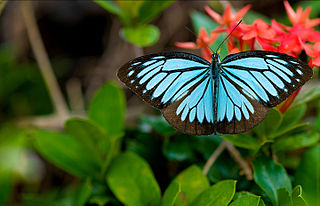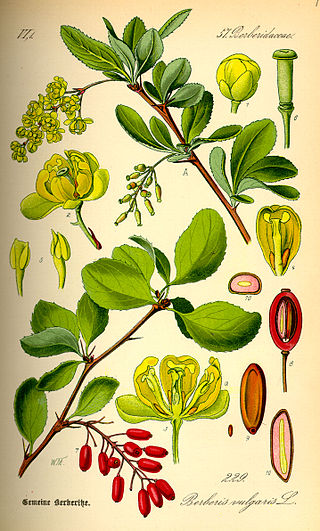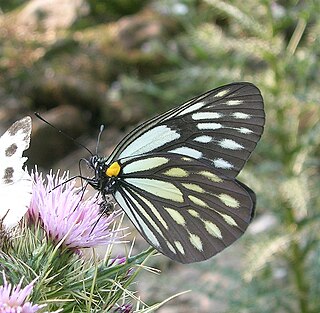
The Pieridae are a large family of butterflies with about 76 genera containing about 1,100 species, mostly from tropical Africa and tropical Asia with some varieties in the more northern regions of North America and Eurasia. Most pierid butterflies are white, yellow, or orange in coloration, often with black spots. The pigments that give the distinct coloring to these butterflies are derived from waste products in the body and are a characteristic of this family. The family was created by William John Swainson in 1820.

Berberis, commonly known as barberry, is a large genus of deciduous and evergreen shrubs from 1–5 m (3.3–16.4 ft) tall, found throughout temperate and subtropical regions of the world. Species diversity is greatest in South America and Asia; Europe, Africa and North America have native species as well. The best-known Berberis species is the European barberry, Berberis vulgaris, which is common in Europe, North Africa, the Middle East, and central Asia, and has been widely introduced in North America. Many of the species have spines on the shoots and all along the margins of the leaves.

Aporia crataegi, the black-veined white, is a large butterfly of the family Pieridae. A. crataegi is widespread and common. Its range extends from northwest Africa in the west to Transcaucasia and across the Palearctic to Siberia and Japan in the east. In the south, it is found in Turkey, Cyprus, Israel, Lebanon and Syria. It is not usually present in the British Isles or northern Scandinavia.

Pareronia valeria, the common wanderer or Malayan wanderer, is a medium-sized butterfly of the family Pieridae, that is, the yellows and whites, and is found in India and Southeast Asia. The butterfly found in India is sometimes considered as a separate species, Pareronia hippia.

Berberis vulgaris, also known as common barberry, European barberry or simply barberry, is a shrub in the genus Berberis native to the Old World. It produces edible but sharply acidic berries, which people in many countries eat as a tart and refreshing fruit.

Berberis thunbergii, the Japanese barberry, Thunberg's barberry, or red barberry, is a species of flowering plant in the barberry family Berberidaceae, native to Japan and eastern Asia, though widely naturalized in China and North America, where it has become a problematic invasive in many places, leading to declines in species diversity, increased tick habitat, and soil changes. Growing to 1 m tall by 2.5 m broad, it is a small deciduous shrub with green leaves turning red in the autumn, brilliant red fruits in autumn and pale yellow flowers in spring.

Aporia agathon, the great blackvein, is a mid-sized butterfly of the family Pieridae, that is, the yellows and whites, which is found in Nepal, India, China and Southeast Asia.

Pareronia ceylanica, the dark wanderer, is a medium-sized butterfly of the family Pieridae, that is, the yellows and whites. It is found in Sri Lanka and India.

Aporia, the black-veined whites or blackveins, is a genus of pierid butterflies found in the Palearctic region.

Pseudargyrotoza conwagana is a moth of the family Tortricidae found in Asia and Europe. It was first described by the Danish entomologists, Johan Christian Fabricius in 1775.

Ussuriana is a genus of hairstreaks in the butterfly family Lycaenidae. There are at least four described species in Ussuriana, found in the eastern Palearctic.

Ascia is a genus of butterflies in the family Pieridae. It is monotypic, being represented by the single species Ascia monuste, commonly known as the great southern white, In this species the sexes may differ with the female being either light or dark colored. It is found from the Atlantic and Gulf coasts of the United States, and south to Argentina. It is migratory along the south-eastern coast of the United States, with strays to Maryland, Kansas, and Colorado.

Miscellanea Entomologica was a French entomological scientific journal. It was originally published by Eugène Barthe and established in 1892.

Pareronia hippia, the common wanderer or Indian wanderer, is a medium-sized butterfly of the family Pieridae, that is, the yellows and whites. It is found in India. Some authors consider this as a subspecies of Pareronia valeria.

Cacia cretifera is a species of beetle in the family Cerambycidae. It was described by Frederick William Hope in 1831. It is known from Java, Cambodia, India, Myanmar, China, Nepal, Thailand, Laos, and Vietnam. It feeds on Berberis thunbergii and Albizia julibrissin.

Aporia acraea is a butterfly species in family Pieridae. The species occurs in China, where it is found in western Sichuan and northern Yunnan.
Aporia chunhaoi is a species of butterfly in the genus Aporia. It is found in northwest Yunnan. Aporia chunahoai is similar to Aporia lhamo, but it can be distinguished by its larger size, paler male hindwing, as well as different genitalia.

Mimaporia is a genus of moths in the Oriental swallowtail moth family Epicopeiidae consisting of two species, Mimaporia hmong and Mimaporia owadai. First described in 2017 by Shen-Horn Yen and Chia-Hsuan Wei, as the sole species Mimaporia hmong, from museum specimens held at the Natural History Museum, London. The second species, Mimaporia owadai was discovered two years after the initial description. Its members are found in Northern Vietnam, Northern India, and Sichuan Province in China.

















